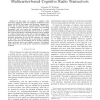Free Online Productivity Tools
i2Speak
i2Symbol
i2OCR
iTex2Img
iWeb2Print
iWeb2Shot
i2Type
iPdf2Split
iPdf2Merge
i2Bopomofo
i2Arabic
i2Style
i2Image
i2PDF
iLatex2Rtf
Sci2ools
VTC
2006
IEEE
2006
IEEE
Effects of Bit Allocation on Non-Contiguous Multicarrier-Based Cognitive Radio Transceivers
— In this paper, we evaluate a cognitive radio transceiver employing both non-contiguous multicarrier modulation (NC-MCM) and adaptive bit allocation. Although NCMCM and bit allocation have potential benefits with respect to enabling dynamic spectrum access (DSA) and increasing throughput, they also require the transmission of overhead information between the transmitter and the receiver. To reduce this overhead information, operating parameters can be assigned to a block of subcarriers, at the cost of some throughput. The trade-offs between subcarrier block size and two different bit allocation approaches for several DSA scenarios are assessed in this work. The results show that as percentage of available spectrum decreases, the throughput loss of systems employing larger subcarrier block sizes rapidly increases. Nevertheless, larger block sizes also yield greater reductions in transmission overhead.
| Added | 12 Jun 2010 |
| Updated | 12 Jun 2010 |
| Type | Conference |
| Year | 2006 |
| Where | VTC |
| Authors | Alexander M. Wyglinski |
Comments (0)

